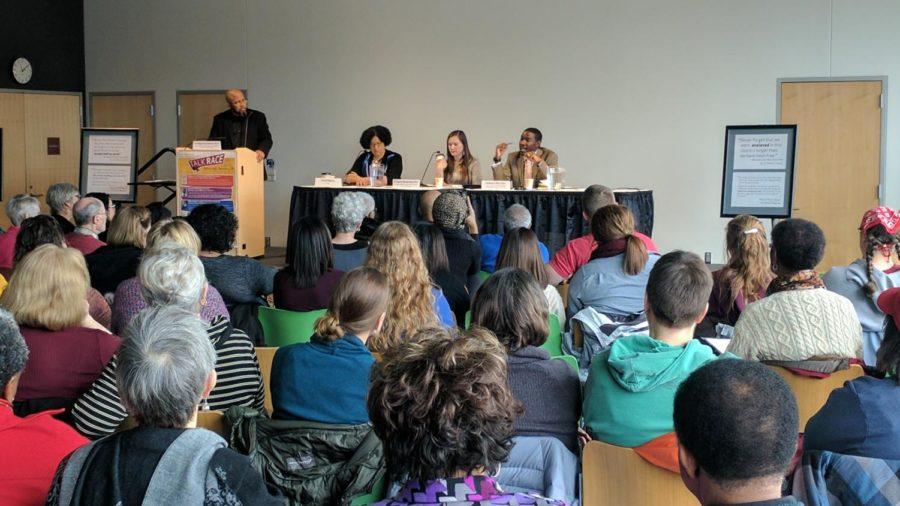- App Content
- App Content / News
- News
- News / Academics
- News / Politics And Administration
- News / State
- News / Student Life
Experts lead discussion on race issues at Ames library
Chris Anderson/Iowa State Daily
The Talk Race: “Between the world and me” panel discussion was led by Reginald Stewart, Vice president for diversity and inclusion at Iowa State.
January 29, 2017
A panel of authors, professors and experts spoke Saturday on race issues at the Ames Public Library as part of Talk RACE, a discussion of race issues featured in “Between the World and Me,” a book by Ta-Nehisi Coates, American writer, journalist and educator.
To open the event, the panelists discussed what they feel is a lack of substance in today’s educational system with respect to black history.
“Education isn’t always knowledge,” said Joshua Barr, director of the Des Moines Civil and Human Rights Department.
Barr recalled an instance where he went to speak in front of 600 students. Barr said he asked the students what civil rights activists they knew of besides Martin Luther King Jr. and Rosa Parks. The question was followed with silence.
Barr said that when students are not taught the substance behind the black history curriculum, or if it is taught once and not made a priority, students become uninformed of racism circulating in schools, in turn paralyzing their awareness.
Reginald Stewart, vice president for diversity and inclusion and keynote speaker of the event, said racism is not being brought to awareness like other issues.
“The 22 push-up challenge brought awareness,” Stewart said. “So what about ending gun violence and bringing awareness to this cause?”
The 22 push-up challenge was a popular movement dating back to August 2016 that brought awareness to the claim that, on average, 22 military veterans take their lives every day in the United States.
The panelists said that teachers struggle to talk to their students about what is going on historically and politically because it will be seen as too political.
But Jeanne Bissonnette, assistant professor in Iowa State’s School of Education, said everything is political.
“Be mindful as parents and teachers who matters,” Bissonnette said. “It’s not just in what we say but what we don’t say. I truly believe that if we are going to disrupt systems of oppression, it’s from a place of love.”
She said that the curriculum of the U.S. education system is white-based, and white people have the benefit of seeing their heritage affirmed and seen as normal.
When white people see a different story, it becomes political, Bissonnette said.
The panelists agreed that no group or individual should be looked at as a minority. They also agreed that no one should ever feel as if they are one.
Stewart shared a story of how he used to love visiting new cities. He would drive around and get to know the community before his conference meetings.
Now, Stewart said he can no longer do this because he does not want to have rented a car with his out-of-state ID as a black man.
“It is very shameful to say that I can’t do something,” Stewart said.
Stewart said this feeling of not being able to do normal things that he should be able to do stems from cultural illiteracy. Cultural illiteracy is the lack of knowledge of history, social norms and beliefs systems other than your own.
He said that it limits everyone’s ability to communicate with other people, resulting in snap judgements and impulse reactions.
Stewart believes cultural illiteracy has divided America.
“Children of culturally-illiterate parents have grown up to be culturally-illiterate adults themselves,” Stewart said. “Sadly, we don’t unlearn the behaviors. We just replicate them.”
In order to stop the oppression, individuals must become culturally literate and unlearn the false history, Stewart said.
Stewart said he wants students at Iowa State to know that they can do something to get informed about race issues and help others be informed here on campus.
He believes everyone must think globally and act locally, saying he wants students to start researching how they can get involved on campus and start asking questions.
“You’ll see a different community if you open your eyes a little wider,” Stewart said, closing his keynote challenge.







